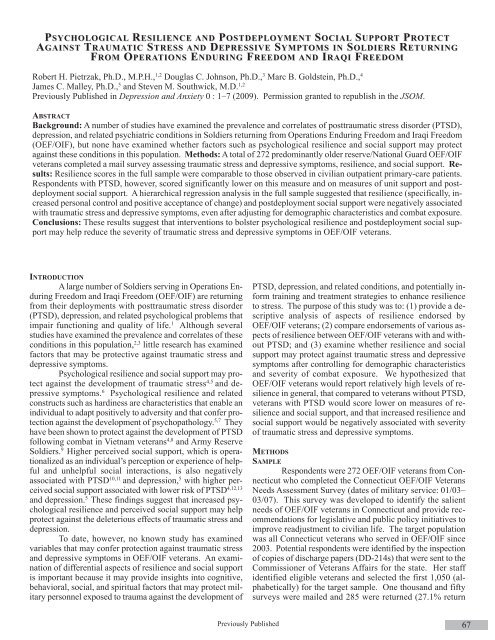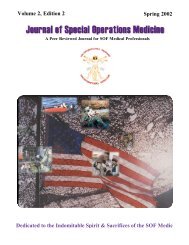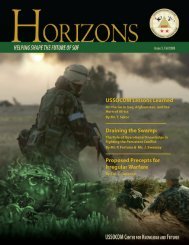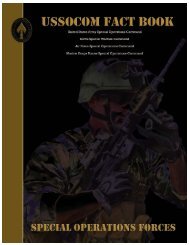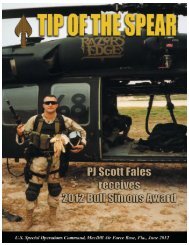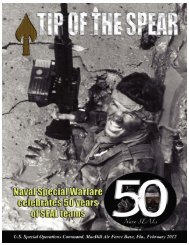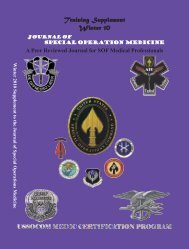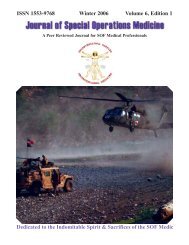Summer - United States Special Operations Command
Summer - United States Special Operations Command
Summer - United States Special Operations Command
Create successful ePaper yourself
Turn your PDF publications into a flip-book with our unique Google optimized e-Paper software.
PSYCHOLOGICAL RESILIENCE AND POSTDEPLOYMENT SOCIAL SUPPORT PROTECTAGAINST TRAUMATIC STRESS AND DEPRESSIVE SYMPTOMS IN SOLDIERS RETURNINGFROM OPERATIONS ENDURING FREEDOM AND IRAQI FREEDOMRobert H. Pietrzak, Ph.D., M.P.H., 1,2 Douglas C. Johnson, Ph.D., 3 Marc B. Goldstein, Ph.D., 4James C. Malley, Ph.D., 5 and Steven M. Southwick, M.D. 1,2Previously Published in Depression and Anxiety 0 : 1–7 (2009). Permission granted to republish in the JSOM.ABSTRACTBackground: A number of studies have examined the prevalence and correlates of posttraumatic stress disorder (PTSD),depression, and related psychiatric conditions in Soldiers returning from <strong>Operations</strong> Enduring Freedom and Iraqi Freedom(OEF/OIF), but none have examined whether factors such as psychological resilience and social support may protectagainst these conditions in this population. Methods: A total of 272 predominantly older reserve/National Guard OEF/OIFveterans completed a mail survey assessing traumatic stress and depressive symptoms, resilience, and social support. Results:Resilience scores in the full sample were comparable to those observed in civilian outpatient primary-care patients.Respondents with PTSD, however, scored significantly lower on this measure and on measures of unit support and postdeploymentsocial support. A hierarchical regression analysis in the full sample suggested that resilience (specifically, increasedpersonal control and positive acceptance of change) and postdeployment social support were negatively associatedwith traumatic stress and depressive symptoms, even after adjusting for demographic characteristics and combat exposure.Conclusions: These results suggest that interventions to bolster psychological resilience and postdeployment social supportmay help reduce the severity of traumatic stress and depressive symptoms in OEF/OIF veterans.INTRODUCTIONA large number of Soldiers serving in <strong>Operations</strong> EnduringFreedom and Iraqi Freedom (OEF/OIF) are returningfrom their deployments with posttraumatic stress disorder(PTSD), depression, and related psychological problems thatimpair functioning and quality of life. 1 Although severalstudies have examined the prevalence and correlates of theseconditions in this population, 2,3 little research has examinedfactors that may be protective against traumatic stress anddepressive symptoms.Psychological resilience and social support may protectagainst the development of traumatic stress 4,5 and depressivesymptoms. 6 Psychological resilience and relatedconstructs such as hardiness are characteristics that enable anindividual to adapt positively to adversity and that confer protectionagainst the development of psychopathology. 5,7 Theyhave been shown to protect against the development of PTSDfollowing combat in Vietnam veterans 4,8 and Army ReserveSoldiers. 9 Higher perceived social support, which is operationalizedas an individual’s perception or experience of helpfuland unhelpful social interactions, is also negativelyassociated with PTSD 10,11 and depression, 5 with higher perceivedsocial support associated with lower risk of PTSD 4,12,13and depression. 5 These findings suggest that increased psychologicalresilience and perceived social support may helpprotect against the deleterious effects of traumatic stress anddepression.To date, however, no known study has examinedvariables that may confer protection against traumatic stressand depressive symptoms in OEF/OIF veterans. An examinationof differential aspects of resilience and social supportis important because it may provide insights into cognitive,behavioral, social, and spiritual factors that may protect militarypersonnel exposed to trauma against the development ofPTSD, depression, and related conditions, and potentially informtraining and treatment strategies to enhance resilienceto stress. The purpose of this study was to: (1) provide a descriptiveanalysis of aspects of resilience endorsed byOEF/OIF veterans; (2) compare endorsements of various aspectsof resilience between OEF/OIF veterans with and withoutPTSD; and (3) examine whether resilience and socialsupport may protect against traumatic stress and depressivesymptoms after controlling for demographic characteristicsand severity of combat exposure. We hypothesized thatOEF/OIF veterans would report relatively high levels of resiliencein general, that compared to veterans without PTSD,veterans with PTSD would score lower on measures of resilienceand social support, and that increased resilience andsocial support would be negatively associated with severityof traumatic stress and depressive symptoms.METHODSSAMPLERespondents were 272 OEF/OIF veterans from Connecticutwho completed the Connecticut OEF/OIF VeteransNeeds Assessment Survey (dates of military service: 01/03–03/07). This survey was developed to identify the salientneeds of OEF/OIF veterans in Connecticut and provide recommendationsfor legislative and public policy initiatives toimprove readjustment to civilian life. The target populationwas all Connecticut veterans who served in OEF/OIF since2003. Potential respondents were identified by the inspectionof copies of discharge papers (DD-214s) that were sent to theCommissioner of Veterans Affairs for the state. Her staffidentified eligible veterans and selected the first 1,050 (alphabetically)for the target sample. One thousand and fiftysurveys were mailed and 285 were returned (27.1% returnPreviously Published 67


